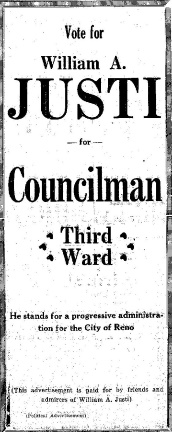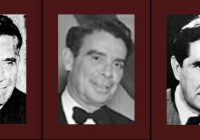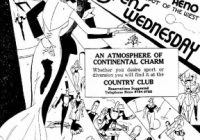|
Listen to this Gambling History blog post here
Getting your Trinity Audio player ready...
|

Justi
1923-1945
Reno, Nevada’s Third Ward city councilman during the 1920s and 1930s was “owned by” the local Mobsters, acted in their interests and protected them, contended Harold S. Smith, Jr., Harolds Club co-owner, in his book I Want to Quit Winners. That councilmember was William A. Justi (1873-1945).
The Third Ward encompassed the “liberal” district, which included most of Reno’s gambling establishments (Nevada State Journal, April 18, 1945). The covered area was between Sierra Street on the west, the railroad tracks on the north, the city boundary on the east and the Truckee River on the south.
Here’s some information about Justi that could support Smith’s allegations:
Mobster Affiliation
Justi worked at the Bank Club, overseeing its bar and cigar store, from 1919 or 1920 until his health failed a few years before he passed away. Heads of the local syndicate William “Bill” Graham and James “Jim” McKay owned the club from 1931 until after Justi died. The three men had to know one another from that association alone. Also, given that the Bank Club was a casino, did a councilmember and, thus, gambling-related policymaker, working there not constitute a conflict of interest?
 Political Dominance
Political Dominance
Justi served on the Reno City Council for 21 years, from 1923 to roughly 1944, through four mayoral administrations.* Why did he win every election?
“Mr. Justi dominated the ward and though several attempts were made to defeat him and also to change the ward boundaries by legislative action, they all came to naught and in late years, he had little opposition,” the Nevada State Journal reported (April 18, 1945).
Further, “when efforts ware made later to change the ward system or provide for the election of councilmen at large, Justi always led the opposition to such moves,” according to the Reno Evening Gazette (April 18, 1945).
On the city council, Justi held a lot of sway, as indicated by the Nevada State Journal.
“For eight years the entire policy of the city government has been determined by E. E. Roberts, its mayor, and by William A. Justi, the mayor’s chief representative in the city council,” noted the newspaper (April 21, 1931). Later, it reported, “Outspoken, [Justi] was one of the most influential members of the city council” (April 18, 1945).
Casino Interests
Right after Nevada legalized gambling in 1931, Justi introduced an ordinance that would limit gaming to a zone in Reno, bounded, respectively, on the west and east by Virginia Street and the city limit, and on the north and south by Commercial Row and First Street. That restriction would have benefitted the owners of the existing big clubs, including Graham and McKay.
Justi’s fellow councilmembers, however, rejected the proposal. In fact, the council would not pass such an ordinance until 1947, instituting what would be called the Red Line.
Law Enforcement Control
Justi also was the city council’s police committee chairman, who had “direct charge of police activities under the mayor,” including the power to make arrests (Reno Evening Gazette, Jan. 29, 1929). Justi held the post from 1929 to 1935.
He “wanted the position from the time he first became a member of the [city council],” reported the Reno Evening Gazette (Jan. 29, 1929). The newspaper later described that in that role, Justi “virtually controlled police affairs” (March 16, 1936).
In one instance in 1930, the Reno Police Department did not take the action that Justi wanted in regard to a man who fired shots in a Lake Street hotel. Justi expressed his displeasure and demanded they heed his word in the future.
“Justi let it be known around the police station that hereafter he will expect his recommendations in such cases to be observed,” according to the Reno Evening Gazette (Oct. 18, 1930).
Waived Procedures
While Justi was the police committee chairman, Graham and McKay seemed to receive special treatment from law enforcement. For instance, when Graham shot Blackie McCracken dead in June 1931 in the Haymarket, police officers arrested but didn’t book Graham and let him go free without paying bail. Witnesses described Graham’s actions as self-defense, in response to McCracken shooting through the club’s front door at around 4 a.m., allegedly intending to kill Graham for having fired him from his craps dealing job at the Stockade brothel.
Further, despite District Attorney Melvin E. Jepson requesting a grand jury inquiry of that fatal shooting and Judge Benjamin F. Curler indicating such a body would be called within the week, it looks like such an investigation didn’t happen, based on no media reports of the same. However, it is possible, albeit remotely, that a grand jury inquiry took place but just wasn’t reported on by the local newspapers.
In September of that year, Justi was seen displaying a gold badge containing two diamonds and engraved with “police commissioner,” which he received from “friends” (Reno Evening Gazette, Sept. 12, 1931). Reno did not have such an official, yet subsequently, Justi was referred to in the local newspapers as “police commissioner.” Who gave him such an expensive gift and lofty title? And why?
————————————
* The administrations were those of E.E. Roberts (1923-1933), Sam Frank (1934-1935), John A. Cooper 1936-1937), August Frohlich (1938-1942) and Harry Stewart (1943-).






